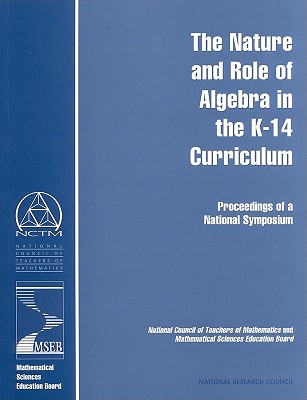With the 1989 release of Everybody Counts by the Mathematical Sciences Education Board (MSEB) of the National Research Council and the Curriculum and Evaluation Standards for School Mathematics by the National Council of Teachers of Mathematics (NCTM), the "standards movement" in K-12 education was launched. Since that time, the MSEB and the NCTM have remained committed to deepening the public debate, discourse, and understanding of the principles and implications of standards-based reform. One of the main tenets in the NCTM Standards is commitment to providing high-quality mathematical experiences to all students. Another feature of the Standards is emphasis on development of specific mathematical topics across the grades. In particular, the Standards emphasize the importance of algebraic thinking as an essential strand in the elementary school curriculum. Issues related to school algebra are pivotal in many ways. Traditionally, algebra in high school or earlier has been considered a gatekeeper, critical to participation in postsecondary education, especially for minority students. Yet, as traditionally taught, first-year algebra courses have been characterized as an unmitigated disaster for most students. There have been many shifts in the algebra curriculum in schools within recent years. Some of these have been successful first steps in increasing enrollment in algebra and in broadening the scope of the algebra curriculum. Others have compounded existing problems. Algebra is not yet conceived of as a K-14 subject. Issues of opportunity and equity persist. Because there is no one answer to the dilemma of how to deal with algebra, making progress requires sustained dialogue, experimentation, reflection, and communication of ideas and practices at both the local and national levels. As an initial step in moving from national-level dialogue and speculations to concerted local and state level work on the role of algebra in the curriculum, the MSEB and the NCTM co-sponsored a national symposium, "The Nature and Role of Algebra in the K-14 Curriculum," on May 27 and 28, 1997, at the National Academy of Sciences in Washington, D.C. Table of ContentsFront MatterIntroductionOpening RemarksKeynote AddressesPresentations on Day OneSynthesis of Day OnePresentations on Day TwoClosing RemarksAppendix A: Symposium AgendaAppendix B: List of ParticipantsAppendix C: Speaker BiographiesAppendix D: Invited PapersAppendix E: A Framework for Constructing a Vision of Algebra: A Discussion Document
With the 1989 release of Everybody Counts by the Mathematical Sciences Education Board (MSEB) of the National Research Council and the Curriculum and Evaluation Standards for School Mathematics by the National Council of Teachers of Mathematics (NCTM), the "standards movement" in K-12 education was launched. Since that time, the MSEB and the NCTM have remained committed to deepening the public debate, discourse, and understanding of the principles and implications of standards-based reform. One of the main tenets in the NCTM Standards is commitment to providing high-quality mathematical experiences to all students. Another feature of the Standards is emphasis on development of specific mathematical topics across the grades. In particular, the Standards emphasize the importance of algebraic thinking as an essential strand in the elementary school curriculum.
Issues related to school algebra are pivotal in many ways. Traditionally, algebra in high school or earlier has been considered a gatekeeper, critical to participation in postsecondary education, especially for minority students. Yet, as traditionally taught, first-year algebra courses have been characterized as an unmitigated disaster for most students. There have been many shifts in the algebra curriculum in schools within recent years. Some of these have been successful first steps in increasing enrollment in algebra and in broadening the scope of the algebra curriculum. Others have compounded existing problems. Algebra is not yet conceived of as a K-14 subject. Issues of opportunity and equity persist. Because there is no one answer to the dilemma of how to deal with algebra, making progress requires sustained dialogue, experimentation, reflection, and communication of ideas and practices at both the local and national levels. As an initial step in moving from national-level dialogue and speculations to concerted local and state level work on the role of algebra in the curriculum, the MSEB and the NCTM co-sponsored a national symposium, "The Nature and Role of Algebra in the K-14 Curriculum," on May 27 and 28, 1997, at the National Academy of Sciences in Washington, D.C.
Get The Nature and Role of Algebra in the K-14 Curriculum by at the best price and quality guranteed only at Werezi Africa largest book ecommerce store. The book was published by National Academies Press and it has pages. Enjoy Shopping Best Offers & Deals on books Online from Werezi - Receive at your doorstep - Fast Delivery - Secure mode of Payment
 Jacket, Women
Jacket, Women
 Woolend Jacket
Woolend Jacket
 Western denim
Western denim
 Mini Dresss
Mini Dresss
 Jacket, Women
Jacket, Women
 Woolend Jacket
Woolend Jacket
 Western denim
Western denim
 Mini Dresss
Mini Dresss
 Jacket, Women
Jacket, Women
 Woolend Jacket
Woolend Jacket
 Western denim
Western denim
 Mini Dresss
Mini Dresss
 Jacket, Women
Jacket, Women
 Woolend Jacket
Woolend Jacket
 Western denim
Western denim
 Mini Dresss
Mini Dresss
 Jacket, Women
Jacket, Women
 Woolend Jacket
Woolend Jacket
 Western denim
Western denim
 Mini Dresss
Mini Dresss






























































